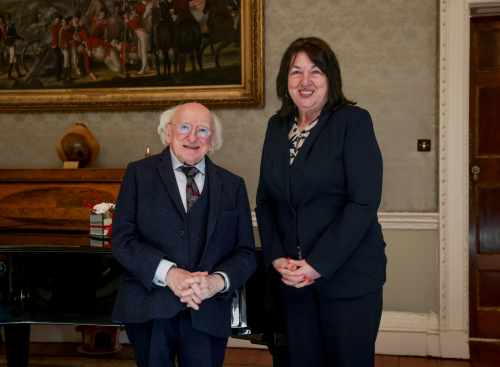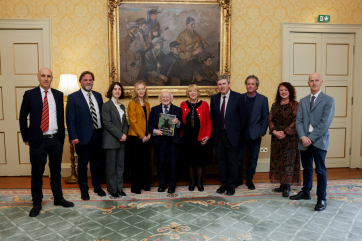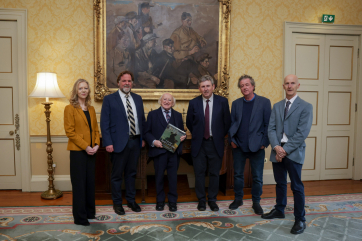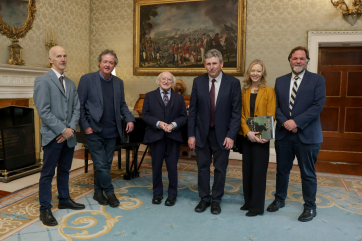Speech at the BT Young Scientist & Technology Exhibition 2025
RDS, Dublin, 8th January 2025
A cháirde,
May I offer my very best wishes to all of the students participating in this year’s BT Young Scientist and Technology Exhibition, and may I pay a special tribute to all those teachers and parents who have been such an essential source of encouragement and, of course, to all those who have played a role in organising this year’s event. Traoslaím libh go léir.
I am delighted to have had the opportunity of having opened the Young Scientist every year during my Presidency, and I am deeply encouraged that it goes from strength to strength, with 2,069 projects submitted to compete in this year’s competition, from which 550 projects were selected to go through to compete here in the RDS.
May I welcome in a special way the students from Austria, Denmark, Italy, Jordan, Kenya and Luxembourg who are taking part this year. You are so welcome.
I welcome too students from the nine schools from Northern Ireland who have qualified this year. Congratulations to all who have made it to the competition.
Projects this year cover a range of fascinating topics in areas - including health, climate change and ecology - that while showing a scientific curiosity, also offer a range of new and adaptable technologies in these areas.
Encouragingly, projects on the theme of environmental sustainability, including pollution, waste management, renewable energy, biodiversity and conservation, accounted for over a quarter of all projects entered for 2025. I look forward to visiting a number of projects today.
At a more general but fundamental level, may I suggest that the future of humanity requires a science without borders built on co-operation in the interest of humanity, accepted as a shared responsibility.
In relation to such an achievement, today I want to pose some questions to all of the young people gathered here, our scientists of tomorrow. What is the appropriate place for science in society? To whom should its benefits primarily seek to serve?
I suggest that the history of scientific curiosity is a rich source. Ancient civilisations engaged with both abstract thinking and practical issues including hydrology, astronomy and ethics, and legal rights, such as, for example, the Code of Hammurabi. In many cultures, scientific curiosity drew contributions from the greatest minds, many of whom combined it with philosophy.
Today, the role of social values in research, the neutrality of science in policy, the interplay between evidence and decision-making, the structures of ownership and control, are real issues.
May I suggest to all of you that, as young scientists, the greatest fulfilment for yourself and others can be when you locate your contribution within a commitment for the welfare of all global citizens.
To achieve this, studying science, including giving time for its history long before its present contemporary applications, is very important, as is the opportunity to assess priorities.
We are living in circumstances that have given rise to multiple interlocking challenges and indeed crises, existential as in terms of nature itself – rising poverty, deepening inequality and global hunger, catastrophic climate change and biodiversity loss, the ongoing promulgation of war and an encouraged perception of the impotence of diplomacy. All of these present circumstances are inextricably linked.
Despite this challenging, even depressing, context, it is both an exciting and a morally challenging time to be a young scientist – challenging, undoubtedly, but so potentially fulfilling to know that the choices you make will have effects that are important, not just for your own time but for the very possibility of life in its diverse forms on our shared, vulnerable planet.
Science is such an important and influential discipline – one with a history as old as human thought. Science offers great possibilities that have a pivotal role to play and, at its best, in responding to the great humanitarian challenges of our time, and has the potential to make an essential contribution to understanding, sustaining and making our world more fulfilling for us all in peaceful co-existence with nature and each other.
Pierre Teilhard de Chardin saw this as being achievable but through little less than a species evolution in human consciousness.
Science is never neutral in its purpose or application. How its fruits are used and distributed is one of the tests of our humanity, our shared cultures, our ethics. Science does not seek to offer an absolute universal truth. It does, however, offer methodologically verifiable interpretations that can question certainties, trigger reflections, generate valuable questions.
Yes, the fruits of science in its history have revolutionised life, enabled tremendous social change, with humankind benefitting from scientific advances in so many areas of life. Yet we must recognise that the misuse of scientific knowledge, however, has been and can be disastrous for us all.
Theodor Adorno of the Frankfurt School of Philosophy was an early scholar to warn of the limitations of science without moral responsibilities – the slow development of science in understanding the human brain, with its orientation pushed away for authoritarian and short-term application, covertly and overtly, from key emancipatory disciplines, ones that could help us achieve the goal of being able to live together in conditions of mutual respect and peace. These include philosophy, sociology, ethics, et al.
The alternative is a science without moral compass as to its applications, the use of science as a tool for the acquisition of unaccountable power and influence in a manner that threatens democracy itself.
History shows us that, when being exercised and practised in the wrong hands or funded by those of authoritarian tendency for insidious purposes, science can produce catastrophic results.
Science, for example, can at the present time be employed to generate ever-more sophisticated weapons and instruments of death and destruction that are used to generate fear for populations while supporting the insatiable drive of military-industrial complexes for profits, even if this is at the cost of undermining democratic accountability through corruption, unaccountable lobbying, and bribery in continents where millions are starving and societies are being divided over access to resources for life itself.
What a shocking statistic it is that world military expenditure increased for the ninth consecutive year in 2023, to a figure of $2.44 trillion, the highest ever recorded. At the same time, the number of people affected by hunger has risen by 200 million globally.
It is important that we respond to this use of science and the rhetoric that calls for war as a state of mind, including to the recent appalling comments from NATO calling for ever-more armaments spending to be achieved. This may, we were told, cause pain in the present so as to achieve security in the future, and it may be, the Secretary-General of NATO, Mr Rutte stated, even at the expense of investing in essentials in education, social protection and health.
We must envisage with those of different and diverse outlook and work for peace, I suggest. All of the international instruments which have been collectively agreed by a diversity of nations and peoples are predicated on the possibility of peace. The UNESCO constitution states that peace begins in the minds of men and women. This is also the basic foundation of the terms of the European Treaties.
We must avoid indifference to such moral choices, be active in seeking a positive science that can yield truly emancipatory results for humanity. Science has, in recent times, for example, dramatically changed our means of communication, the way we work, our production of food, our methods of transportation, and, through medical research and practice, even the length and quality of life itself. Science has, through long hours spent in laboratories, come to our aid with vaccines in responding to pandemics.
However, appropriate public transparency and a commitment to co-operate and share science has yet to be achieved as a common practice.
What a powerful example too of the positive role which science can play has been in its providing irrefutable scientific evidence of climate change. In taking on that responsible role, among its other contributions, science has helped to inform a social, economic and political debate on the urgent need to reduce greenhouse gas emissions and, thus, remain within the planet’s ecological boundaries, protect the Earth and all the life on it from the catastrophic consequences of global warming and biodiversity loss.
It is vital, therefore, not to be indifferent to the responsibilities of scientists, in enhancing a moral consciousness as to the importance of working within an ethical framework, a consciousness that must be central to any scientific endeavour, one that can help to guide our use and application of scientific discovery.
I have faith in the ability of our young Irish scientists to locate their gifts, their brilliance, in a moral and ethical context. I know from meetings with them that they are more than willing to work for the benefit of all humanity beyond any well-earned personal reward. The vulgar depictions of life on offer from those who see scientific innovation as an opportunity to brandish their wealth and power are not regarded as human models to be emulated by the young scientists I have met over the years.
We have so many great role models of Irish scientists who pursued science for social betterment. I think of the ground-breaking work of Nobel Laureate William C. Campbell from Donegal, whose research on river blindness led to the drug Ivermectin which was made available to all by Merck from 1987, leading 30 years later to 3 billion treatments being delivered, river blindness being eliminated in Central and South America, and significantly reduced in Africa.
Other Irish scientists whose efforts focused on a social outcome include the late Robert Collis, the Dublin doctor who pioneered the technique for feeding premature infants via a nasal tube and who invented a simple, but affordable, incubator for premature infants.
I think too of the late Vincent Barry from Cork who led a medical research team that discovered a compound that ultimately yielded a treatment for leprosy.
The work of Dr Dorothy Stopford-Price is closely associated with the BCG vaccine, which protected against tuberculosis at a time when 16 percent of deaths in Ireland were attributable to the disease.
Drs Campbell, Collis, Barry and Stopford-Price are in the tradition of the great Dr Jonas Salk who believed that scientific discoveries should benefit all, without borders, state or fiscal.
Then, too, we have the great Tuam-born scientist and author Mike Cooley. He understood what a moral outrage it had become, what a great failure, with all the material resources available, that our boundless capacity for creativity and innovation, and the fruits of science and technology, remain focused in so many parts of the world, not on the ending or the elimination of preventable global hunger or famine, or the promotion and preservation of peace, or indeed on reducing sources of inequality, but rather on the pursuit of ever-more deadly technologies as instruments of war.
Surely there is an alternative, as Dr Cooley and others have shown. Surely knowledge and discovery is for sharing, and the practice of science and the appropriate delivery of its work through appropriate technology should flow to all unimpeded by boundaries or income.
Science itself, we must never forget, is a method that involves co-operative work, sharing of purposes, as well as the joy of discoveries, even with serendipitous discoveries.
We are all paying the price for the absence of that evolved consciousness, of which Teilhard de Chardin wrote, that would lead to an international politics that enabled the sharing of such scientific and technological discovery. This would require that governments, citizens and corporations work together, co-operate with real meaning and purpose, with the aim of ensuring that the fruits of science contribute solutions to the great global, social, economic and ecological challenges that we all face on our burning planet.
There is a vital role for ethical science in seeking to advance the possibilities of fulfilment for all that are there beyond the narrow provision of a source of wealth for any single individual or corporation.
We have had the capacity to eliminate extreme global poverty. Preparing for war has driven it off the agenda. As I wrote this speech, six infants under four weeks’ old had died of hypothermia in their tents in Gaza. Having been displaced three times, the grieving father of twins said, “there were eight of us, and we had only four blankets”.
Available waterproof tents, food and clothing, over 1.5 millions’ worth, were present in the region, but were not allowed access to starving families in sub-zero conditions.
Now is the time to rethink the relationship between science and society in its multiple manifestations. Young scientists and technologists have not only a great responsibility, but ever-increasing opportunities to be conscientious and conscious as to where their work will be applied. Their moral choice has repercussions for us all.
What encourages me to hope is that I see gathered here not only brilliant young scientists and technologists, full of innovative ideas and creativity, and their teachers and parents, but also enthusiastic global citizens, all of which bodes well for their giving support and leadership in the achieving of a sustainable and cohesive future on our island and a harmonious existence on this, our vulnerable planet.
I look forward to reading in the future of you young scientists being added to the names I referred to earlier, the great socially orientated scientists working for the benefit of all, not only at home, but in Africa, South America and Asia.
May I encourage you all to help each other with patience and kindness in your work, and to co-operate in advancing the truly emancipatory potential of science for society and for all of life. May your participation in the Young Scientist further drive your interest and determination to continue to play a role in science, its application, and its delivery for the betterment of all on our shared, vulnerable planet.
Traoslaím libh uilig, gach dalta agus scoil atá ag glacadh páirt gach duine a bhí cabhrach. Beir beannacht.
I wish you all a Happy New Year.




